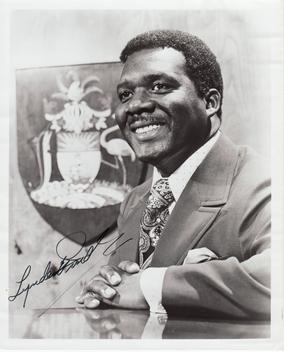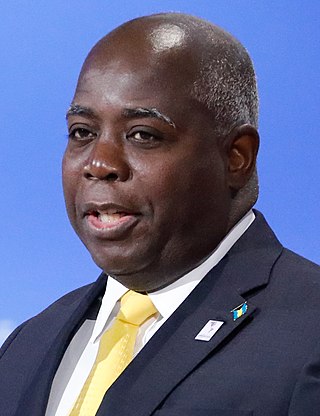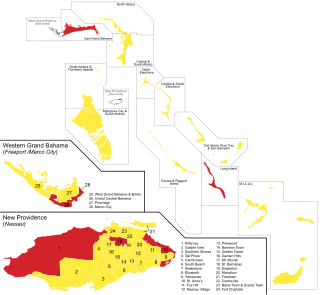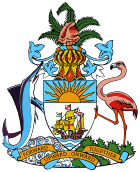
The Bahamas is a parliamentary constitutional monarchy headed by King Charles III in his role as King of the Bahamas. The politics of The Bahamas takes place within a framework of parliamentary democracy, with a Prime Minister as the Head of Government. The Bahamas is an Independent Country and a member of the Commonwealth of Nations. As a former British colony, its political and legal traditions closely follow those of the United Kingdom. King Charles III is the head of state, but executive power is exercised by the cabinet. Legislative power is vested in the two chambers of parliament. The Judiciary is independent of the executive and the legislature and jurisprudence is based on English common law. The multi-party system is dominated by the Progressive Liberal Party and the Free National Movement. The constitution protects freedom of speech, press, worship, movement, and association.

Bermuda is the oldest British Overseas Territory, and the oldest self-governing British Overseas Territory, and has a great degree of internal autonomy through authority and roles of governance delegated to it by the national Government. Its parliament held its first session in 1620, making it the third-oldest continuous parliament in the world. As part of the British realm, King Charles III is head of state and is represented in Bermuda by a Governor, whom he appoints on the advice of the British Government. The Governor has special responsibilities in four areas: external affairs, defence, internal security, and policing.

Sir Lynden Oscar Pindling, KCMG, PC, NH, JP was a Bahamian politician who is regarded by some as the "Father of the Nation", having led the Bahamas to majority rule and independence.

Perry Gladstone Christie PC, MP is a Bahamian former politician who served as prime minister of the Bahamas from 2002 to 2007 and from 2012 to 2017. He is the second longest-serving Bahamian elected parliamentarian, representing the Centreville constituency from 1977 to 2017. He is also a former athlete. His Progressive Liberal Party is the oldest Bahamian political party, holding solid majorities in the Bahamian Parliament several times in its long history.
The Free National Movement is a political party in the Bahamas formed in the early 1970s and led by Sir Cecil Wallace-Whitfield. The current leader of the party is Michael Pintard and the current deputy leader is Shanendon Cartwright.

Elections in the Bahamas take place in the framework of a parliamentary democracy. Since independence, voter turnout has been generally high in national elections, with a low of 87.9% in 1987 and a high of 98.5% in 1997. The current Prime Minister is The Hon. Philip Davis. The electorate is less than half of citizenry.
The United Bermuda Party (UBP) was a political party in Bermuda, which represented itself as centrist party with a moderate social and fiscal agenda. The party held power in Bermuda's House of Assembly continuously from 1968 to 1998, the 47-year-old party was dissolved on 30 June 2011 after the majority of its members joined the One Bermuda Alliance.

General elections were held in the Bahamas on 2 May 2007. The result was an opposition victory, with the Free National Movement, led by former Prime Minister Hubert Ingraham, claiming 23 of the 41 seats. Incumbent Prime Minister Perry Christie conceded defeat in a phone call to his rival. Ingraham was sworn into the office of Prime Minister on 4 May.

General elections were held in the Bahamas on 2 May 2002. The opposition Progressive Liberal Party (PLP) won 29 of the 40 seats in the House of Assembly to defeat the governing Free National Movement (FNM). Voter turnout was 90.2%.

General elections were held in Bermuda on 18 December 2007 to elect all 36 members of the House of Assembly. The incumbent Progressive Labour Party (PLP) led by Ewart Brown was returned for a third term, with 22 of the 36 seats of the House of Assembly, with the opposition United Bermuda Party (UBP) winning the remaining 14 seats.

Philip Edward "Brave" Davis is a Bahamian politician serving as the prime minister of the Bahamas since 2021. He was the Member of Parliament (MP) for Cat Island, Rum Cay & San Salvador from 1992 to 1997 and returned to the seat in May 2002, which he still represents.
The United Bahamian Party (UBP) was a major political party in the Bahamas in the 1950s and 1960s. Representing the interests of the white oligarchy known as the Bay Street Boys, including Stafford Sands, it was the ruling party between 1958 and 1967. It was led by Roland Theodore Symonette.
The Labour Party was a minor political party in the Bahamas. In the 1962 general elections it won a single seat, taken by Randol Fawkes. Fawkes retained his seat in the 1967 elections, in which the United Bahamian Party and the Progressive Liberal Party won 18 seats each. Although the UBP had won more votes, Fawkes supported the PLP, allowing them to form a government. Fawkes retained his seat again in the 1968 elections, but the party did not contest the 1972 elections.
The One Bermuda Alliance (OBA) is one of two political parties in Bermuda with elected members of the Bermuda's legislative assembly. It was created in May 2011 by the merger of most members of Bermuda's two non-Labour parties, the United Bermuda Party and the Bermuda Democratic Alliance. It won the 2012 election and governed until 2017. Since then, it has been the official opposition in Bermuda's House of Assembly.
Sir Randol Francis Fawkes was a Bahamian politician, trade unionist and lawyer.

The prime minister of The Bahamas is the head of government of The Bahamas. The prime minister is formally appointed into office by the Governor-General of The Bahamas, who represents Charles III, the King of The Bahamas.
Dame Doris Sands Johnson was a Bahamian teacher, suffragette, and politician. She was the first Bahamian woman to contest an election in the Bahamas, the first female Senate appointee, and the first woman granted a leadership role in the Senate. Once in the legislature, she was the first woman to be made a government minister and then was elected as the first woman President of the Senate. She was the first woman to serve as Acting Governor General of the Bahamas, and was honored as Dame Commander of the Most Excellent Order of the British Empire by Queen Elizabeth II.

General elections were held in the Bahamas on 16 September 2021 to elect all 38 members of the House of Assembly.
Sir Cecil Vincent Wallace-Whitfield was a Bahamian politician who was a founding member and the first leader of the Free National Movement political party. He also served as a Minister in the cabinet of Lynden Pindling from 1967 to 1970 and as a longtime member of the Bahamian Parliament.









